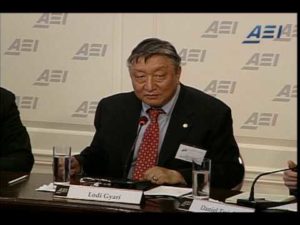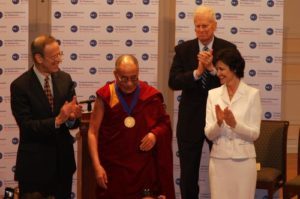
YouTube
The death last month of Lodi Gyari, who as the Dalai Lama’s special envoy conducted nine rounds of negotiations with Beijing over Tibet’s status, offers an occasion to reflect on the increasingly troubled relationship between the United States and China, says Carl Gershman, president of the National Endowment for Democracy.
While he failed in his negotiations with Beijing, he was immensely successful as the Dalai Lama’s special envoy in Washington, building bipartisan backing for the Tibet Policy Act (2002), which institutionalized support for Tibet in U.S. foreign policy, he writes for The Washington Post:
He had many allies in this effort, but none was more devoted than Nancy Pelosi, the California Democrat who is the presumptive next House speaker and whose heartfelt statement on the passing of Gyari emphasized that “members of Congress on both sides of the aisle benefitted from Lodi’s insight and wisdom.” She could be an important ally in building bipartisan congressional support for a new China policy.
 Two additional elements of such a policy are also tied to Gyari, Gershman (right) adds:
Two additional elements of such a policy are also tied to Gyari, Gershman (right) adds:
- The first is the importance he attached to the role of India, which has given refuge to the Dalai Lama and the Tibetan government-in-exile, and whose free political environment, he said, “has deeply enriched my thinking.” The Trump administration has emphasized the growing strategic partnership with India, which must be a core part of U.S. policy.
- The second element is democracy. Gyari, like the Dalai Lama, believed in the paramount importance of democracy for all people, not least for Tibetans and Chinese. Following the Tibet uprising in 2008, Chinese dissident and future Nobel laureate Liu Xiaobo wrote, “Democratization for all of China is the necessary condition for any solution, whatever its form, to the Tibet issue.”
India’s role is crucial to support democratic resilience in its neighborhood, argues Constantino Xavier, a Fellow in Foreign Policy Studies at Brookings India, in New Delhi. India must emphasize a positive agenda for South Asia and expand on its efforts to cooperate with neighboring countries on strengthening the rule of law, pluralist institutions, and good governance, he writes for the Power 3.0 blog:
 First, India is uniquely positioned within the developing world to engage in a deeper dialogue on the how to address key social, economic, and technological challenges through the rule of law, in a democratic setting. While the United States and European countries can make important contributions to share best practices, countries like Myanmar will find India’s experience of greater relevance, based on their common background and similar profiles. ….
First, India is uniquely positioned within the developing world to engage in a deeper dialogue on the how to address key social, economic, and technological challenges through the rule of law, in a democratic setting. While the United States and European countries can make important contributions to share best practices, countries like Myanmar will find India’s experience of greater relevance, based on their common background and similar profiles. ….- Second, while India and other democracies must focus on these emerging challenges, they should not neglect the fundamental institutions and processes that underpin democracy. As several countries in the region undergo reforms and are now setting up their own democratic infrastructures, India must further expand its support by drawing on its own tradition of democracy assistance. This includes training thousands of foreign parliamentary officials, and sharing the experience of its Election Commission, which recently set up a new international institute whose programs have, for example, found great demand from Myanmar….
- Finally, India must continue to engage other “like-minded” powers at the regional and global levels. The shared commitment to democracy and human rights is now increasingly acknowledged in India’s growing ties with Japan, Australia and the European Union, paving the way for greater democratic cooperation across the Indo-Pacific. India should look for opportunities to work with other established democracies at the international level to breathe new life into the UN Democracy Fund and the Community of Democracies, and create new platforms to exchange democratic assessments and best practices…..







